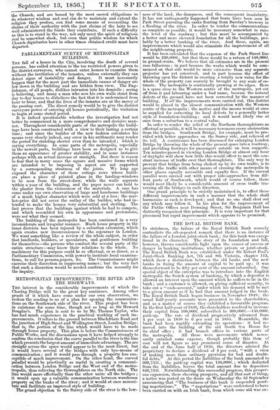PARLIAMENTARY SURVEY OF METROPOLITAN BUILDINGS.
TEE fall of a house in the City, involving the death of several persons, has called attention to the too restricted powers given to the district surveyors, who cannot enter, houses to examine them without the invitation of the inmates, unless externally they can detect signs of instability and danger. It must necessarily happen that for the most part the immediate causes of danger are low down in the building and are hidden from view. The Eng- lishman, of all people, dislikes intrusion into his domicile ; Boeing is believing, and many a man who sees his own walls stand from day to day learns to disbelieve the fact that it is undermined from hour to hour' and that the lives of the inmates are at the mercy of the passing cart. The direct remedy would be to give the district surveyors power of entering all houses periodically, the visitation to begin at some stated period. It is indeed questionable whether the investigation had not better be commenced in a more comprehensive and decisive man- ner. Throughout considerable parts of the metropolis the build- ings have been constructed with a view to their lasting a certain time ; and since the builder of the new fasMon calculates his means very closely indeed, any error in his arithmetic may render the period for standing shorter even than he intended ; which is saying everything. In some parts of the metropolis, especially in the newest parts, buildings have been so designed as to give them an appearance of .greater stability, and in some instances perhaps with an actual increase of strength. But there is reason to fear that in many cases the square and massive forms which are intended to be imposing in aspect are not supported by a corresponding stoutness of the joists. We long ago exposed the character of those cottage rows whose build- ers place a piece of painted glass in the landing-windows to be seen from the street-door, while the walls separate within a year of the building, and the paper never can hold to the plaster from the viciousness of the materials. A case has come under our own observation of large and handsome buildings of a much higher character which were sold at a loss : the mar- ket-price did not cover the outlay of the builder, who had in- tended to make the houses very substantial and Aerling. The fact proves that the buildings against which he had to compete, and which resembled his own in appearance and pretensions, were not what they seemed. The building of the metropolis has been continued in a very inconsiderate and irregular manner. Much house property in the inner districts has been injured by a suburban extension which again creates new inconveniences to the sojourner in London. We want something like a review of the whole subject, in order that landlords, builders, or speculators, and gentlemen building for themselves—the persons who conduct the several parts of the entire structure—may know their relations to the whole. No machinery for this purpose could be so effectual, or so direct, as a Parliamentary Commission, with power to institute local examina- tions, to call for personslpapers, &c. The Commissioners might exercise their discretion in suppressing names ; but the very fact that such a discretion would be needed confirms the necessity for the inquiry.


























 Previous page
Previous page